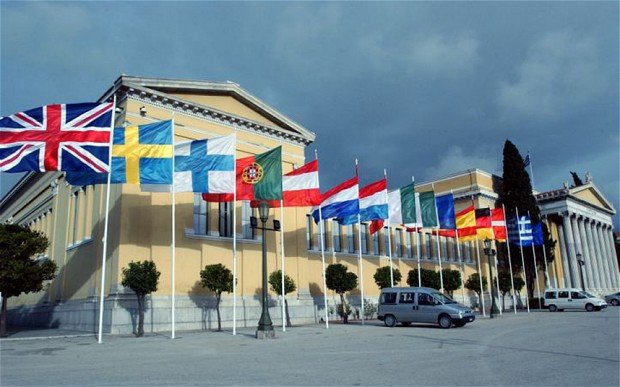
The economy of the eurozone shrank 0.2% in the three months from April to June compared with the previous quarter.
The figures from Eurostat covering the 17 countries that use the euro followed zero growth in the previous quarter.
Europe’s biggest economy, Germany, grew by 0.3% in the second quarter, helped by exports and domestic consumption.
France announced its economy had recorded zero growth in the period, which was better than had been expected.
The French economy had also posted zero growth in the previous two quarters.
GDP measures the total amount of goods and services produced by an economy.

“Germany has asserted itself thanks to growing exports to countries outside the eurozone,” said Christian Schulz at Berenberg Bank.
“It’s hardly a surprise that consumption has increased due to low unemployment, rising wages and a low rate of inflation.”
The economies of the 27 members of the EU also contracted by 0.2%.
Among the eurozone’s biggest contractions, Portugal’s GDP shrank 1.2%, Cyprus recorded a 0.8% contraction and Italy was down 0.7%.
Comparable figures from Ireland and Greece are not yet available.
On Monday, Greece released GDP figures that showed its economy contracted by 6.2% in the second quarter, compared with the same period a year earlier, but did not provide figures for the quarter compared with the previous quarter.
The first quarter’s zero growth means the eurozone is still not in recession on the generally accepted definition of two consecutive quarters of negative growth, but the outlook for the rest of the year is gloomy.
“What we see is a vicious circle of budget cuts, high interest rates in the periphery and sovereign debt rising,” said Aline Schuiling at ABN Amro.
“Policymakers are moving very slowly. We expect another contraction in Q3.”
Greece, Spain, Italy, Cyprus and Portugal, all of which are receiving assistance from European bailout funds, are in recession.
“Overall, the story of a resilient core and a floundering periphery continues,” said Azad Zangana at Schroders.
“The resilience of the core economies is likely to be tested in the coming quarters, with leading indicators suggesting slowing order books and falling business confidence.”
An example of the leading indicators was the ZEW index of investor sentiment in Germany, which has declined for the fourth consecutive month to its lowest level this year.